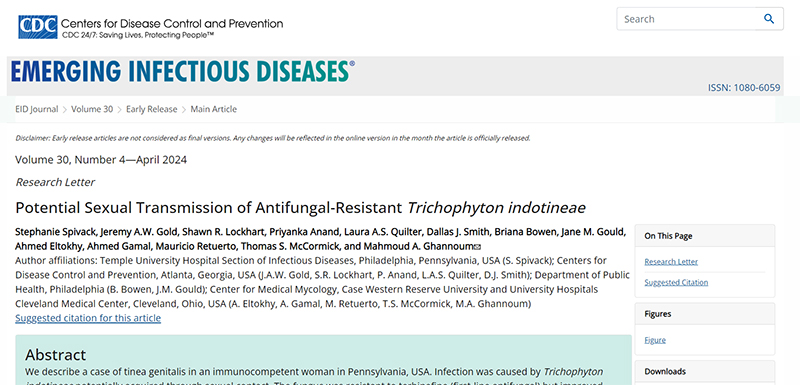
Situation summary:
- Previous reports have described sexual transmission of genital dermatophytosis (common names: ringworm, tinea), but sexual transmission of Trichophyton indotineae, a frequently antimicrobial-resistant emerging fungus, had not been previously reported in the US.
- A female patient in Pennsylvania was diagnosed with T indotineae infection on her genitals after travel in South Asia, where T indotineae infections are widespread.
- The patient was immunocompetent and was likely infected through sexual contact.
- The patient’s new partner in the US later became infected on his genitals, suggesting potential sexual transmission.
- Before antifungal-resistant infection was recognized, the patient experienced substantial diagnostic and treatment delays and received multiple ineffective treatments, including corticosteroids that worsened her infection.
- The fungus was resistant to and failed treatment with terbinafine (first-line antifungal), but the patient’s infection improved with itraconazole.
Clinical pearls:
- T indotineae infections are often resistant to terbinafine, and itraconazole is considered first-line therapy for this pathogen.
- T indotineaeis a potential cause of antifungal-resistant genital lesions. Clinical vigilance is needed to ensure prompt, effective antifungal treatment.
- Visual inspection without diagnostic testing cannot reliably distinguish dermatophytosis from other causes of inflammatory skin conditions (eg, contact dermatitis).
- Subsequent inappropriate use of corticosteroids can exacerbate dermatophytosis.
- Diagnostic testing (eg, with potassium hydroxide preparation) is important to correctly diagnose and appropriately treat dermatophytosis and other fungal skin infections.
Public health implications:
- Expand surveillance such as through sexual-health-provider networks to identify emerging trends in severe and antifungal-resistant dermatophytosis.
- Conduct studies to understand T indotineae transmission dynamics.
- Increase laboratory capacity to identify dermatophyte species and test for antifungal susceptibility.
Actions for clinicians suspecting antifungal-resistant dermatophytosis:
- Contact state and local health departments for assistance and awareness (https://www.cdc.gov/publichealthgateway/healthdirectories/index.html)
- If suspected sexual transmission, request consultation for challenging STD cases through the CDC-funded STD prevention training centers STD clinical consultation network (https://stdccn.org)
Assistance for public health officials
Public health officials concerned about potential cases of antifungal-resistant dermatophytosis or unusual clusters of cases can email FungalOutbreaks@cdc.gov for assistance with recommendations and testing.

